Thursday, May 21st 2020

ASRock Launches AMD B550 Motherboard Range
Leading global motherboard manufacturer, ASRock, proudly announces its latest range of motherboards featuring the new AMD B550 chipset, supporting AMD Ryzen desktop processors. "ASRock AMD B550 motherboard series brings exciting and innovating features such as PCIe 4.0 to the mainstream, ASRock offers a comprehensive range of motherboards from entry to premium, including the Taichi, PG Velocita, Extreme, Steel Legend and Pro4 series, leading features and excitement into the market." says Chris Lee, general manager of ASRock motherboard business unit.
"We are seeing increasing user demands for flexible systems that perform well in a multitude of tasks from gaming to content creation more than ever before," said Chris Kilburn, corporate vice president and general manager, client component business unit, AMD. "AMD is excited to bring the power of 3rd Gen AMD Ryzen desktop processors and cutting edge PCIe 4.0 support to the mainstream users with our latest AMD B550 chipset. With a wide range of form factors, power delivery options, and designs from our partners at ASRock, AMD is confident these new B550 platforms will provide flexibility and power never seen before on a mainstream platform."The premium ASRock B550 Taichi incorporates 16 phases of the latest Dr.MOS VRMs, providing a superior power design that can handle even the highest performance Ryzen desktop processor, even when overclocking. With large, passive heatsinks and 2oz Copper PCB foundation, it keeps temperatures lower, the system is more stable and improves energy efficiency.
PG Velocita is a brand new high end product line under the Phantom Gaming family, the B550 PG Velocita motherboard packed full with uncompromised performance as well as relentless appearance. "Velocità" is Italian for "Velocity", destined to give a fast and unbeatable gaming experience to the gamers
Intelligent 2.5GbE is featured on many ASRock high-end & mainstream B550 products for maximum network performance. It is ideal for home NAS streaming and backups, content creators, online gamers, and the high-end demands of enthusiasts by boost networking performance 2.5X over typical GbE home networks to enjoy a noticeably faster connectivity experience for gaming, file transfers and backups.
With a wide range of options available including everything from entry to premium, mini-ITX, mATX and ATX, look no further because the ASRock B550-series motherboards bring luxury features and stylish designs throughout its comprehensive range.
"We are seeing increasing user demands for flexible systems that perform well in a multitude of tasks from gaming to content creation more than ever before," said Chris Kilburn, corporate vice president and general manager, client component business unit, AMD. "AMD is excited to bring the power of 3rd Gen AMD Ryzen desktop processors and cutting edge PCIe 4.0 support to the mainstream users with our latest AMD B550 chipset. With a wide range of form factors, power delivery options, and designs from our partners at ASRock, AMD is confident these new B550 platforms will provide flexibility and power never seen before on a mainstream platform."The premium ASRock B550 Taichi incorporates 16 phases of the latest Dr.MOS VRMs, providing a superior power design that can handle even the highest performance Ryzen desktop processor, even when overclocking. With large, passive heatsinks and 2oz Copper PCB foundation, it keeps temperatures lower, the system is more stable and improves energy efficiency.
PG Velocita is a brand new high end product line under the Phantom Gaming family, the B550 PG Velocita motherboard packed full with uncompromised performance as well as relentless appearance. "Velocità" is Italian for "Velocity", destined to give a fast and unbeatable gaming experience to the gamers
Intelligent 2.5GbE is featured on many ASRock high-end & mainstream B550 products for maximum network performance. It is ideal for home NAS streaming and backups, content creators, online gamers, and the high-end demands of enthusiasts by boost networking performance 2.5X over typical GbE home networks to enjoy a noticeably faster connectivity experience for gaming, file transfers and backups.
With a wide range of options available including everything from entry to premium, mini-ITX, mATX and ATX, look no further because the ASRock B550-series motherboards bring luxury features and stylish designs throughout its comprehensive range.
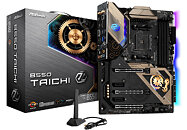
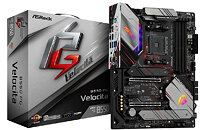
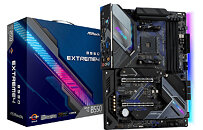
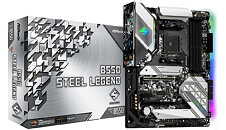
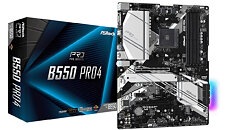
19 Comments on ASRock Launches AMD B550 Motherboard Range
Sounds like you should wait for whatever comes after AM4, I don't think X670 is even a given at this point.
The reason I say X670 is whenever Ryzen3 launches I fully expect that new boards will be released as well. Everything is pointing to a truly magnificent 3rd quarter for enthusiasts.
We can dream up all the lanes we want for the X570 successor, but AM4 is still a mainstream socket. Z490 didn't really up the ante in this regard either (or any other).
That motherboard stood out on the usual VRM quality charts as punching way above its price range. Better than Asus TUF/Prime options and any of the similarly-priced Gigabyte and MSI stuff. I have one in the machine I'm typing on right now and I've used it for a few other Zen2 builds that were budget-sensitive and not dumping a 3900X into the socket.
For higher end builds I suspect MSI will have the upper-midrange sewn up. I just hope their BIOSes aren't still garbage.
Their A-XMP proved to be quite useful for people who are clueless about high frequency RAM, as MSI boasting it alongside their MemTryIt.No need to manually tweak timing or fiddling with DRAM Calculator, just 3 - 4 reboot and you have optimal timing with highest clock. On the contrary, their voltage regulator kinda subpar :wtf:
I follow Buildzoid because he seems to know his s*** when it comes to motherboards and his summary of 400-series boards praised MSI for having the best midrange VRM design and VRM cooling but the worst BIOSes all four Tier-1 vendors.
I dislike the MSI ClickBIOS but I don't generally have a problem with them. They're needlessly graphical and a bit disorganised but I can get the settings I want from them and have never encountered show-stopping bugs. He genuinely hates them - if you really start to do advanced tuning you'll run into broken features that don't do what they're supposed to, don't apply unless you do them in a specific order, or conflict with other settings. Like most reviewers, he'll be providing feedback to manufacturers on pre-release products and beta BIOS versions so the fact that stuff is still broken AFTER they've been assisting vendors with product development is probably extra annoying.Asrock BIOSes have been decent for me. They're pretty minimal but outside of the raw exposed AGESA options everything just works. The AGESA pages you need to know what you're doing and shouldn't touch a single option unless you fully understand that you can't always touch one thing without having to also compensate for other stuff. As a basic BIOS for everyday users looking to do some modest CPU/RAM overclocking I can't fault Asrock.